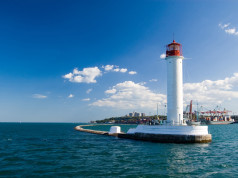By Yuliya Sushenko, participant of The Odessa Review journalism seminar and workshop
The news headlines are full of discouraging statistics: every year, an enormous number of people leave Odessa and Ukraine. Much has been written about the problems of our compatriots: how to survive the “emigrant syndrome,” and to adapt and learn to be content under any circumstances. Indeed, many have exactly that experience — they become successful, prosperous and happy. Yet, one out of three immigrants returns, the pull of this city being what it is. Here are the brief stories of five Odessans who returned to the city of their birth.
Anatoliy Gorbatyuk: Los Angeles – Odessa
In Odessa, Anatoliy headed one of the construction management companies in the port. When his daughter won a study grant to the United States in 1997, the entire family packed their bags, sold the apartment, and followed their daughter to Los Angeles. “We settled down quite quickly. I wrote for major Russian newspapers, then founded my own paper, the ‘Odesskiy Mayak,’ where I worked as the main editor.”
Eventually, his daughter’s circumstances changed and she moved to New York. Having been left by themselves, Anatoliy and his wife decided to return to Odessa. But how? How to go back to a place where without a job or place to live anymore? Seeing her parents suffer, Anatoliy’s daughter traveled to Odessa to buy them an apartment in the same area that they had once lived before. In fact, she was able to buy back the very same apartment in which they used to live!
The Gorbatyuks returned to Odessa. Anatoliy now writes articles, historical books, biographies. He is active in the World-Wide Club of Odessites, and goes to jazz concerts with his musician friends. “Now, every morning I wake up happy,” Anatoliy admits. “When I am home, I feel alive!”
Irina Averina: Moscow – Odessa
Ira moved from Odessa to Moscow 9 years ago. There, she was occupied with a variety of interesting projects, including theatrical laboratories for young directors, discovering new names. Her international theater project was successful enough to receive the “Golden Mask” and hold its own festival “Open Doors”… But no one could predict how difficult the next few years would be for the country. The decision was difficult, but Ira returned to her home city. She had to start from scratch — in the new reality, in the midst of a crisis, when no one knew what might happen tomorrow. She returned to a different country than the one she had left.
In the course of a year and a half, Ira found like-minded directors of Ukrainian theaters, theater experts and critics with whom she organized the first international theatrical laboratory for young directors in Ukraine — at the Odessa Theater of the Young Viewer, then in Kyiv’s operetta theaters and the Golden Gate Theater, in the Ivan Kozlovsky Art-center. The idea was supported by the Ministry of Culture, the French Institute, and the project was an official partner of the GogolFest children and adolescents program in 2015 and 2016. It is because of her initiative that the format of express-laboratories is becoming popular in Ukraine, opening doors into the professional world for young creative people.
Ira views her return to Odessa philosophically: “Life always surprises you. In Russia I started ‘from zero.’ Every time, I step into a new river and open a new door. Everyone knows the phrase ‘May you be spared from living in times of change.’ I am not sure that those are the words of Confucius, but in any case I like another of his sayings much better: ‘it’s better to light a small candle than spend your life cursing the darkness.’”
Antonina Uzun: Sophia – Odessa
Tonya is an ethnic Bulgarian. She was born in the Odessa region, but ever since she was 12 she had always known that she would go back to Bulgaria, and to her roots. When she turned 17, she left Odessa to begin studies in the Sophia University journalism department. School was easy for her, but after she received her diploma, it was impossible to find a job. She became disappointed in Bulgarian journalism as soon as she encountered what she considered to be a grubby reality. For three more years she worked odd jobs — as a waitress, a bartender, a manager and a designer.
She was offered a job at an Odessa newspaper “Roden Kraj” published in Bulgarian. “I didn’t think twice about buying a ticket home,” Tonya recalls. “After 8 years in Bulgaria, I was often asked why I returned. But I always knew that I had the ‘incurable disease of patriotism.’ I came back to a country that I didn’t recognize. When I left in 1992, Ukraine as such did not exist, and on returning, I had to acquaint myself with a new reality.”
In Odessa, Tonya has done everything — hosted programs on national TV and radio in Bulgarian, wrote for newspapers and online media, managed PR campaigns. She participated actively in the Bulgarian diaspora. Theater, KVN (comedy sketch show), choir — she gets incredible enjoyment from everything. “Only once did it occur to me that it would be better in Europe. It happened in the dorm where I had to stay right after returning to Odessa. There, right in the middle of the hallway, I saw a rat! In Bulgaria that would be impossible…” Right now Antonina is not working, she say she is learning to take time out for herself. Still, everything that connects her to the diaspora has stayed in her life. “On my second day of being back in Odessa I realized that I was in the right place. I still feel that way.”
Katerina Kiper: Berlin – Odessa
Katya may not be a typical protagonist for a story of failed immigration, but she is also a very significant one. In 2001, at the age of 17, she won the World Best Model contest and goes to work in the United States on a model contract for 4 years. She was just out of school, and did not speak any English. She worked a lot, learned the language, and got accepted to art school where she studied design. After her contract in the States ran out, she spent a few years in Turkey, and then spontaneously moved to Berlin where she lived for 5 more years. But Odessa is her home port. She returns here again and again from her travels.
Now Katya has taken a serious interest in photography. She is having increasingly more exhibitions and projects, and she is in Odessa more often than not. If only recently she had to ask for museums and galleries to showcase her work, now she gets offered not only joint exhibitions, but her own shows. “No matter how wonderful Europe is, Odessa is my home. My passport is Ukrainian. My parents and friends are here. It’s a good place to study, to relax, to be inspired and to make plans.”
In fact, she does have a lot of plans, including lots of travel. But Odessa is the place where she will always return. She is happy to note that the city is becoming more interesting and vivid: new spaces, clubs and bars are opening. Young Odessans are traveling more and bringing back from Europe positive experiences and useful initiatives that take roots here. There is an active cultural life — concerts, exhibitions, film screenings — every day you can find something interesting to do. “We don’t appreciate a lot of what we have, including our talents. I would like there to be more opportunities for cultural exchange, more programs. We have so many talented artists!”
Yevgeniy Velikiy: Israel – Odessa
Perhaps the greatest outflow of emigration from Odessa has always been to Israel. To this day, hundreds of young people are going to that country on various religious or secular programs. Zhenya was one of them. After graduating from Odessa’s medical school in 2001, he left for the promised land. He studied, worked, studied again and worked again, passed exams, served in the army and worked some more. He lived in the south, in Beersheba. Eventually, he had a son and it seemed everything was going well…
But soon, Evgeniy and his wife got divorced, and overnight he made a decision. On January 1, 2008 he returned to Odessa for good. He also abandoned medicine for good, becoming instead an English teacher, tutor and anthropologist. His father and son, remained in Israel. But he couldn’t go back there even once, although things in Odessa were not easy, especially with daily life. “I remember going to get some kind of doctor’s note for my grandmother in the polyclinic by Shevchenko Park. When I walked in there, I became nauseous from the stench and the dirt.” He speaks to his friends, knows about their financial successes, but has no regrets. “I am not a man of the system. And living in Israel means being part of a very rigid system.”
Now, Zhenya’s life is more settled. He has a new family, children with whom he travels a lot. He says that the only place where he felt better than at home was in Germany. He can’t explain it — he just feels that he could live there, but is not planning to experiment anymore. “I can say, as a doctor, that emigration lands a very heavy blow on a human being, and of course re-emigration is twice as hard.”



































